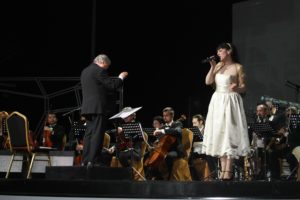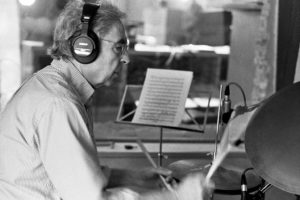

Voyaging in musical time and Spain with Ramón FarránNovember 22, 2016
Speaking to Ramón about the making of the El Olivo album I realised I had a golden opportunity to find out more about his life in music in Spain. He was kind enough to answer my more wide-ranging questions.
Can we start by talking about jazz in Spain, Ramón? It’s a subject I know very little about and am intrigued by. Was it affected by life under Franco?
Everything was forbidden. Anything foreign and anything ‘too local’. Not many people realise that you couldn’t watch French films, listen to jazz or speak Catalan, for instance.
I grew up in post-civil war Barcelona and come from a family of musicians. My father was a great trumpet player, band leader and composer. So I was very lucky that he saw some talent in both my sister and I and allowed us to go music school.
My dear friend Tete Montoliu and I met at the Barcelona Conservatoire, aged about seven and ten (he was a little older than me). We became instant friends. He went on to become the greatest and most internationally known jazz musician ever to come from Spain.
When Tete and I first met, we used to listen to a pirate US radio station from Algiers, and we heard the American Jazz Hour, where they played swing and big band stuff. We were mesmerised. Nothing like this was available anywhere in our country. It was all folk music, bland pop music and zarzuela [a kind of operetta] on the radio and TV, so we used to sit down in a tiny basement room and transcribe the big bands by ear as their music played on the radio. We’d then write it all out nicely and tell our friends how to play it. Later, we’d buy records on the black market, at the port. The American marines used to bring jazz records for us kids and we’d save up for weeks to go and get one record between a bunch of us. We taught a lot of older musicians how to play bebop. Tete and I carried on making our repertoire bigger for our bebop fans.
We were too young to play in jazz clubs, but soon we were playing in afternoon sessions and later on in the evenings – some moustache painting and adopting disguises might have gone on – accompanying international players like Don Byas and Lionel Hampton. They would come to Barcelona from Paris having heard that this bunch of kids knew their repertoire. Looking back, it was quite an amazing time!
That’s wonderful, Ramón. But you’re known for a lot more than just jazz. Could you enlighten us?
I’ve done so many different things in my musical career and still do! I’ve worked in the pop world, also as an arranger, conductor and musical director, in the television and film arenas, and on my own compositions and projects.
As Robert Graves said, ‘I keep dogs (in his case, novels) to feed my cats (his poetry)’! But music is music. I am not a musical snob, I hope, and so I have worked in most areas of music. My first love was jazz, and later I was part of the 60s garage rock movement in Spain as a drummer with my friends from Palma (including the great Errol Woisky and Toni Obrador) and very soon I got into composing and production.
Could you tell me the story of the song ‘Fiesta’?
I was asked to write the Spanish entry for the 1970 Eurovision Song Contest. My then wife Lucia, Robert’s daughter, and I wrote it one morning. We asked our dear friends from the island, Los Valldemossa, to record the song. They were very talented people, all with a fantastic sense of humour.
The song won an award in the pre-Eurovision festival but wasn’t chosen as Spain’s entry. It did, however, reach number one in the Spanish pop charts, which helped pay for a house in Barcelona for our family. We named this Ca’n Disc.
(Natalia Farrán Graves, Ramón’s daughter, adds: In her book about growing up in a bi-cultural environment in Spain, A Woman Unknown, my mother Lucia writes about the experience. She was walking around our neighbourhood in Madrid with me in the pram when she heard some builders whistling the song ‘Fiesta’. It was then that she knew it was going to be a hit and went to buy champagne for when my father got home that evening!)
Walking on the Deià musical wild side a little, do you have any memories of the Soft Machine guys – Robert Wyatt, Daevid Allen and Kevin Ayers?
Oh, so many! Robert Wyatt came to Deià to spend time with us in the early 1960s, as he was undecided as to what to do with his life. He found his answers that summer in Deià. We became instant friends. He was interested in music and especially drums. He asked me lots of questions about my technique, about music, my way of composing, etc. He used to come with us to the Indigo Jazz Club, which I ran, to be with us and watch us play. He was so enthusiastic! I wanted to help him. I told him he had to study more because he had a natural talent. If he didn’t work, I wasn’t going to continue to teach him (I was a tough teacher!). I once told him ‘We don’t talk about music, we make music’. I think this attitude of mine influenced him. During our time together he worked with real enthusiasm.
A great person, Batty Robert (we nicknamed him that after ‘batería’, drums in Spanish, and to distinguish him from Robert Graves). Once, I was doing some rhythmic work with Robert’s poetry to find his logic and rhythm. During one of these performances at home, just for the family, I made Batty take part and he was great. Everyone loved it!
Batty Robert was the founder of Soft Machine, really. He had the seed of the idea. Later, Kevin Ayers and Daevid Allen joined Robert in Deià. Yes, Soft Machine was born in Deià. Before the band had a name, Kevin, Daevid, Robert and I jammed a lot and recorded their original material on machines that Kevin and Daevid brought over from the UK. We recorded in the late 60s and early 70s at Kevin’s house at the bottom of the village. Lady June was there too, as was Didier Malherbe, who later joined Gong. I seem to remember Didier followed Daevid around and was often with him. He stayed in the sheep hut a couple of times, and on occasion we’d find him there sleeping when we went to pick olives.
The material we recorded hasn’t seen the light of day, I don’t think. I wonder what happened to the tapes…
Did you stay in touch?
We were always in touch in some way through mutual friends. Deià is like a big family. Kevin called me sometimes when he needed music-related information. We had a connection. Although we went in different directions musically, we spent an important part of our formative years together. Daevid laughed at everything, defied convention and he was a talented artist. He was a great musician. So were Kevin and Robert. The great Ollie Halsall was around at the time and he was wonderful, too. We did a few gigs at the Indigo.
[The story of the Indigo deserves a blog post to itself. Watch this electric space.]
How do you feel about Mallorca and Deià now?
In the 1980s I wrote a piece inspired by Mallorca called ‘Mediterranea’. I think there’s an international, cultural, artistic crowd in the Balearics as a whole, which in turn attracts more artists and creates a great scene from which to work. This, coupled with the paradisiacal environment gives you peace and inspiration. No drugs required, in my experience!
I’d like to mention the music scene in Deià today. Pamboli Band, of course – most of your readers know that this is the local rock’n’roll band in Deià – who continue the great work of Johnny Caprini (Juan Graves) and are keeping the rock’n’roll flame and tradition alive. I was reminded the other day that my sister Marta played drums and I played keyboard in Pamboli’s first ever incarnation! This was at a concert in Deià, in the summer of 1971, with Juan and Tomás on guitars and Mark McDowell, George’s son, on sax. When my daughters, sons-in-law, nephews and nieces are in Deià they often get up and perform with Pamboli Band.
Brendan McCann is a superb guitarist. Your friend, the charismatic David Templeton, a great local artist, fronts the band, with Johnny Ramone on drums and young additions to the band. It’s wonderful.
Tomás con Gas with Tomás Graves, also in Pamboli, are great to see live, too.
Also, DJ Nin Petit (Llewellyn Graves), my nephew, a fantastically talented DJ who holds ‘Wake Up and Dance!’ events in the daytime. Check him out, he’s been all over the world with his DJing skills. And watch out for the multi-talented Paco Colombàs Mir, known also as DJ Jesucristo and as a member of Oso Leone, a Mallorca band. It’s fun to know that they both sometimes use my recordings in their DJing sessions.
Final words
I’d like to add I’m still active, both playing the drums and composing. I founded the ONJAZZ in 2000 (Spanish National Jazz Orchestra). We’ve released two albums so far (Jaleos and Mujeres en el jazz) and toured around the world with our Spanish symphonic roots jazz, a blend of Spanish folk and classical music and jazz, with collaborations from Randy Brecker, Jerry Gonzalez, Chano Domínguez, Paquito d’Rivera, Antonio Canales and many others.
I’ve just finished completing two commissions, an opera about Picasso and a piece with Indian classical influences, and have recently founded a music publishing company, Farran Music Ltd, in the UK with my sister, daughters, sons-in-law and other talented collaborators, like Nick Philpin who, among many other things, is producing David Templeton’s new podcast. Hamish MacDonald, who was a founding member of the Sex Beatles, a punk band in Mallorca in the 1970s – probably the first Spanish punk band! – and part of the Deià music scene of the time is another very talented songwriter I’m working with. So, you see, everything goes around in a circle. Next, I’m writing my memoirs – so watch this space!
We certainly will, Ramón. Thanks for sharing your fascinating story with us. Tune in next week for the Indigo jazz club story.









